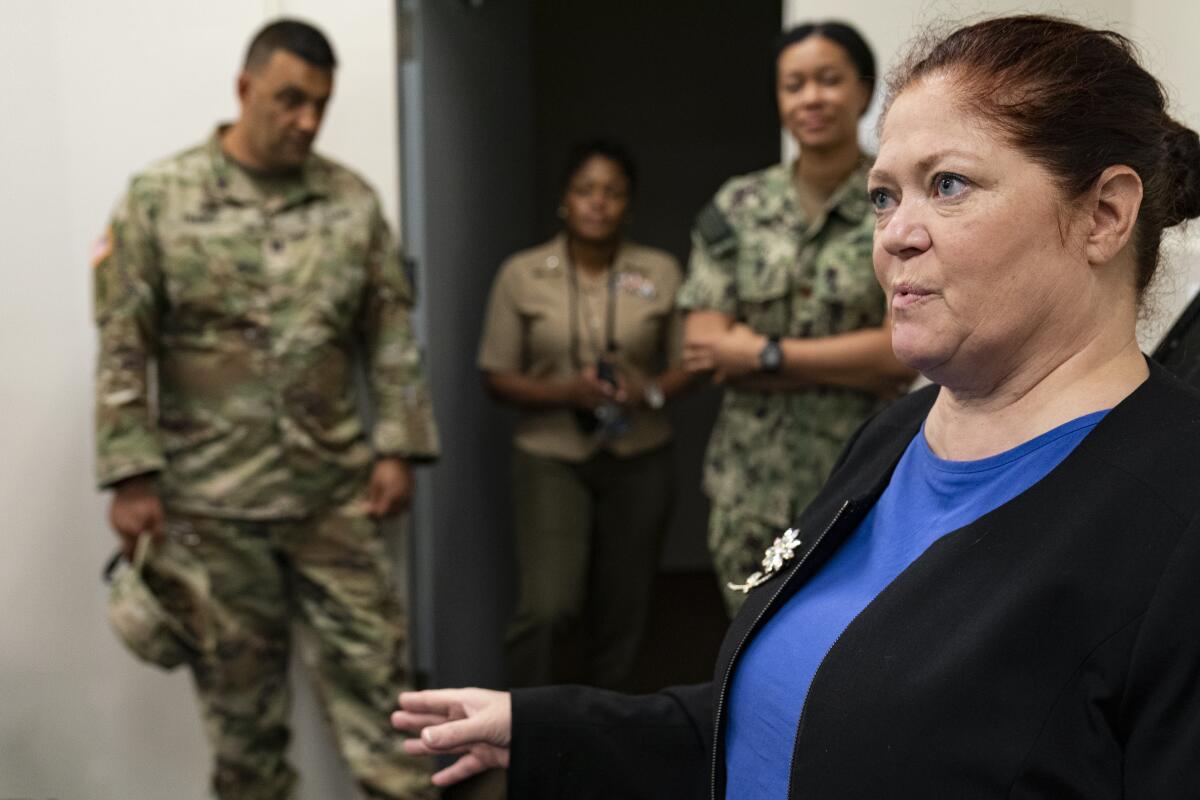Bali nightclub bombing suspects in Guantanamo are charged at protracted arraignment

- Share via
NAVAL STATION GUANTANAMO BAY, Cuba — Three men held at the Guantanamo Bay detention center were formally charged Tuesday in connection with the 2002 Bali nightclub bombings and other plots in Southeast Asia after 18 years in U.S. custody, with defense lawyers insisting afterward that the long-delayed arraignment was so flawed it may have to be repeated.
The men appeared in a secure courthouse encircled by razor wire on the U.S. base in Cuba amid defense complaints about courtroom interpreters that turned an expected brief arraignment before a military judge into a two-day affair.
It was a rocky start to a case already expected to be complex because of the prolonged detention without charges for the three — an Indonesian and two Malaysians — and the brutal treatment they endured in CIA custody.
Encep Nurjaman, the Indonesian militant leader known as Hambali, and the two Malaysians face trial by military commission, which combines elements of civilian and military law, on charges that include murder, terrorism and conspiracy. They have not yet entered pleas.
The start of their long-delayed case comes as other war crimes tribunals at Guantanamo have languished without resolution for years amid legal challenges and as President Biden says he intends to close the detention center, which now holds 39 of the 779 men who were brought to the base following the Sept. 11, 2001, terrorist attacks.
“Frankly, after this two-day arraignment, I didn’t see any evidence that he would get a fair trial,” said Christine Funk, the attorney for Mohammed Farik bin Amin, one of the Malaysian defendants.
The cleric is convicted of plotting the attacks that killed 202 people. Authorities in the region eye security for an upcoming summit.
The defense complained that a Malaysian interpreter’s language skills were so poor that at least one defendant couldn’t understand what was being said in court; that another Malay interpreter was improperly working for the prosecution because he previously assisted the prisoners when they appeared before a prisoner review board at Guantanamo; and that an Indonesian interpreter had been overheard disparaging the men as terrorists who should be killed.
The judge, a U.S. Navy commander, allowed the proceeding to go on despite repeated objections. Defense attorney Brian Bouffard, who represents Malaysian defendant Mohammed Nazir bin Lep, said the arraignment was so flawed it should be done again.
“We have to have a new one because ... this one wasn’t done right,” Bouffard said.
Nurjaman was a leader of Jemaah Islamiyah, a Southeast Asian militant group with ties to Al Qaeda. The U.S. government says he recruited Bin Lep and Bin Amin, among others, for jihadist operations, and that the two Malaysians helped transfer money for their plots.
Start your day right
Sign up for Essential California for the L.A. Times biggest news, features and recommendations in your inbox six days a week.
You may occasionally receive promotional content from the Los Angeles Times.
Among the plots that Al Qaeda and Jemaah Islamiyah carried out were the October 2002 suicide bombings of Paddy’s Pub and the Sari Club in Bali, Indonesia, and the August 2003 suicide bombing of the J.W. Marriott Hotel in Jakarta, Indonesia. The attacks together killed 213 people, including seven Americans. The Bali bombings killed 88 Australians.
It’s unclear why it’s taken so long to charge them before the commission. Prosecutors filed charges against the men in June 2017, but the Pentagon legal official who oversees Guantanamo cases rejected the charges for reasons that haven’t been publicly disclosed.
All three were captured in Thailand in 2003 and transferred to CIA “black sites,” where they were brutalized and subjected to torture, according to a Senate Intelligence Committee report released in 2014. In 2006, they were among a group of 14 men transferred to Guantanamo to face trial by military commission.
Lawyers for Nurjaman and the two Malaysians are expected to argue that the abuse they experienced has tainted any evidence against them, an argument that is also a key element in other war crimes cases at Guantanamo.
President Obama, who ordered the detention center to close at the start of his administration, had sought to move some commission cases to federal court in the U.S. but reversed course amid political opposition, and Congress ultimately blocked efforts to close the prison.
More to Read
Sign up for Essential California
The most important California stories and recommendations in your inbox every morning.
You may occasionally receive promotional content from the Los Angeles Times.













